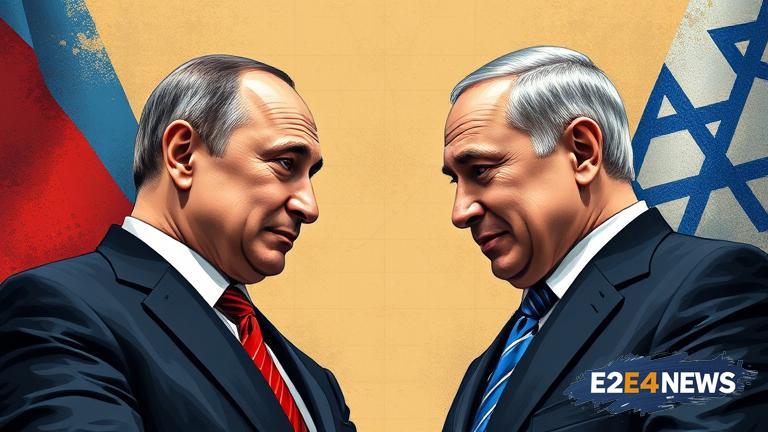The world of geopolitics is complex and ever-evolving, with leaders emerging and shaping the course of history. Two such leaders, Vladimir Putin of Russia and Benjamin Netanyahu of Israel, have been making headlines for their distinctive approaches to governance and international relations. Despite their differences, they share a common bond as oligarchs, wielding significant influence and power in their respective countries. Putin, a former KGB agent, has been at the helm of Russian politics for over two decades, consolidating power and suppressing opposition. Netanyahu, on the other hand, has been Israel’s prime minister for a record-breaking five terms, navigating the country’s complex political landscape with ease. Both leaders have been accused of authoritarian tendencies, with Putin’s regime being criticized for human rights abuses and Netanyahu’s government facing allegations of corruption. Their leadership styles are characterized by a strong sense of nationalism, with Putin emphasizing Russian exceptionalism and Netanyahu promoting a vision of Israel as a Jewish state. They have also been known to use propaganda and disinformation to shape public opinion and sway the narrative in their favor. In terms of foreign policy, both leaders have adopted a assertive stance, with Putin’s Russia engaging in military interventions in Ukraine and Syria, and Netanyahu’s Israel maintaining a hardline approach to the Palestinian conflict. Their relationships with other world leaders have been marked by tension and controversy, with Putin’s interactions with Western leaders being particularly strained. Netanyahu, on the other hand, has cultivated a close relationship with US President Donald Trump, who has been a vocal supporter of Israel. Despite their differences, both leaders have managed to maintain a strong grip on power, thanks in part to their ability to manipulate the media and shape public opinion. Their use of social media has been particularly effective, allowing them to bypass traditional news outlets and communicate directly with their constituents. However, their reliance on propaganda and disinformation has also been criticized, with many arguing that it undermines the integrity of democratic institutions. The impact of their leadership on their respective countries has been significant, with Putin’s Russia experiencing a decline in democratic freedoms and Netanyahu’s Israel facing growing tensions with the Palestinian population. The international community has also been affected, with Putin’s actions in Ukraine and Syria contributing to a destabilization of the global order. Netanyahu’s approach to the Palestinian conflict has also been widely criticized, with many arguing that it undermines the prospects for a two-state solution. As the world continues to grapple with the challenges of globalization and geopolitical instability, the leadership styles and policies of Putin and Netanyahu will remain a subject of interest and concern. Their shared characteristics as oligarchs, combined with their assertive approach to foreign policy, make them key players in the global arena. However, their authoritarian tendencies and reliance on propaganda and disinformation also pose a threat to democratic values and the rule of law. Ultimately, the legacy of Putin and Netanyahu will depend on their ability to balance their national interests with the need to promote global stability and cooperation. As the world moves forward, it will be important to monitor their actions and policies, and to hold them accountable for their impact on the global community. The comparison between Putin and Netanyahu serves as a reminder that leadership styles and policies can have far-reaching consequences, and that the promotion of democratic values and human rights is essential for maintaining global stability and prosperity. The role of the media in shaping public opinion and holding leaders accountable will also be crucial, as will the need for international cooperation and diplomacy in addressing the complex challenges of the 21st century. In conclusion, the similarities between Putin and Netanyahu are a testament to the enduring power of oligarchs in modern politics, and a reminder of the need for vigilance and accountability in promoting democratic values and human rights.
